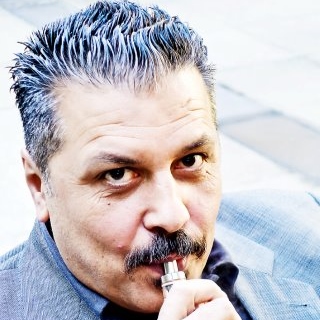
News

Issam Zeitoun: A Syrian who is against Assad and for Israel
JONATHAN KATZENELLENBOGEN
He is gaining a small but growing audience for his views on Syria and Israel, and his proposal for a safe zone on the Golan Heights. After entering into correspondence with academics at a number of Israeli universities about three years ago, he was invited to speak at conferences.
Because of his Israeli contacts, he has been accused of being a Mossad agent and been threatened in Facebook posts. Two years ago, Zeitoun’s car was smashed while he was conducting a live TV interview from Israel. “This is all to be expected,” he says, adding that he won’t be stopped from speaking out.
The 52-year-old Syrian has lived in Germany since 1990, and today works for the town council in the small town of Bad Oeynhausen, near Hanover. He says he speaks on his own behalf, and insists he is entirely independent.
Over the past three years, Zeitoun has spoken at a number of Israel’s universities and also delivered his message at Al Akhawayn University in Ifrane, Morocco.
Zeitoun is in Johannesburg this week at the invitation of the SA Jewish Board of Deputies. His visit will present an alternative to the local version of the annual Israel Apartheid Week movement, albeit not on the same platform.
His meetings in Johannesburg focus on discussing the refugee experience with the African Diaspora Forum. The body was set up after the xenophobic attacks in 2008 to speak on behalf of foreign Africans in South Africa.
Zeitoun will also meet with The African Centre for Migration and Society at the University of the Witwatersrand.
At a conference at The Hebrew University in Jerusalem, he drew the ire of Palestinian protesters by saying they were living in a “paradise” compared to Syrians, according to The Times of Israel.
Their treatment by Israel is far better than those of most Arab countries, where they are restricted in the jobs they are allowed take and still retain a restrictive refugee status,” he says of the Palestinians.
“The main problem is Arab nationalism and its slogans, which have been engraved in the minds of generations as being absolutely true. How do you accept al-Assad’s narrative of what happened to the Palestinians 70 years ago, when he is bombing civilians and using chemical weapons?
“The narrative we’ve been told in the Arab world is wrong and exaggerated. We need to accept that Israel is a reality,” he says.
“In 2018, I am happy that Israel exists. If there had been no Israel, we would have faced much bigger problems with Iran’s expansionist project.”
He refrains from criticising the settlements on the West Bank and says this is a matter for Palestinians and Jews to sort out.
As a child, he says he was brought up on a narrative of hatred towards Israel. “The Palestinian issue occupied a big space in our lives under al-Assad.”
During the 1973 Yom Kippur War, Israel occupied Syrian territory beyond most of the Golan Heights it had taken in the 1967 Six-Day War. During the 1973 war, Israeli forces occupied his hometown of Beit Jinn until they withdrew under the Separation of Forces Agreement in 1974.
Upon his return to his hometown, the young Zeitoun heard “whispers” from the locals that the Israelis had been “kind” and “did not humiliate civilians”. Given the climate of fear, he recalls, nobody could actually talk favourably in public about the Israelis as they might well have been charged with treason.
Although his family were staunch supporters of al-Assad, this early experience made him question what had been ingrained in him.
While his views on Israel and its treatment of Palestinians might be welcomed by many in Israel, his proposal for a safe zone for former residents of the Golan Heights might not be by those on the right.
Zeitoun proposes the creation of a “safe zone”, under Israeli authority, on the Golan Heights for Syrians who used to live in the area prior to the 1967 and 1973 wars. This could raise Israeli fears of a concentration of a potentially hostile population in a sensitive area.
Such a zone, he believes, would show the region the reality of a democratic government in Israel, and would hold out the chance of changing the minds of Muslims about Israel.
The prospects for Syria are bleak as war is likely to continue indefinitely, he believes. Over time, Zeitoun suggests, small militia-governed zones will emerge in Syria that will be in need of international protection.
Israel will, through force of circumstances, have to become more deeply involved beyond its air incursions and humanitarian aid.
For Zeitoun, the real danger for the region is posed by the threat from Iran. “Russia is serving Syria to the Iranians on a silver plate,” he insists.
And, with its power and influence rising in the region as a result of the conflicts in Lebanon, Iraq, Syria and Yemen, Iran is closer to the old Persian dream of an empire that extends from Black Sea to the Persian Gulf and into the Mediterranean, Zeitoun believes.




